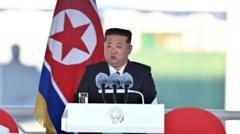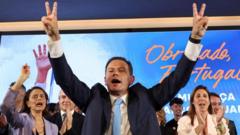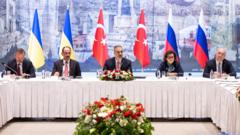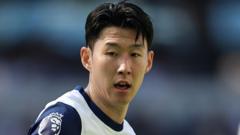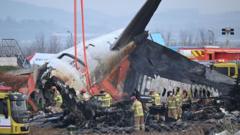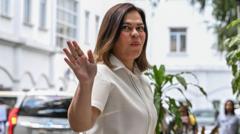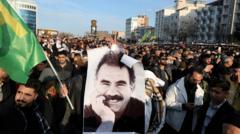**With President Yoon Suk Yeol's removal, South Korea braces for snap elections amidst polarized sentiments and economic challenges.**
**South Korea's Leadership in Crisis: What Lies Ahead After Yoon's Impeachment**
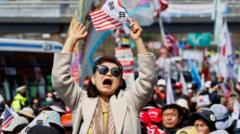
**South Korea's Leadership in Crisis: What Lies Ahead After Yoon's Impeachment**
**Tensions rise as South Korea prepares for a critical election following the impeachment of President Yoon.**
In a startling turn of events, the South Korean Constitutional Court has unanimously voted to uphold the impeachment of President Yoon Suk Yeol, marking a significant moment in the country's democratic journey. Yoon's removal from office was a result of a parliamentary impeachment in December 2022 following an ill-fated attempt to impose martial law during a political standoff. The recent ruling brought crowds to the streets of Seoul, where citizens reacted with a mixture of joy and sorrow.
South Koreans now face the imperative task of electing a new leader by June 3. The political landscape, however, remains fraught with tension. Many citizens are still grappling with the implications of Yoon's aborted martial law, which stirred memories of the nation’s authoritarian past and reignited fears about governance.
The court's verdict highlighted the gravity of Yoon's actions, denouncing the attempt to impose martial law as unjustified and damaging to citizens' political rights. In the wake of the ruling, calls for constitutional amendments have emerged, aiming to bolster democratic institutions and curtail presidential powers. Yet, political analysts suggest that a future leader would need a rare sense of patriotism to willingly relinquish their own authority.
Despite his ouster, Yoon's presidency has left a deep divide in South Korean society. While many citizens rallied against his actions, others have begun to view him as a martyr for right-wing ideologies, clinging to claims of a "communist infiltration" within the government. This division is reflected in the increasing protests and the rise of far-right fringes, as public distrust toward political institutions and electoral processes grows.
As South Korea braces for a new election cycle, the nation urgently requires a leader who can unify its scarred populace. Yoon’s successor will inherit complex challenges, from managing tensions with the United States, especially regarding economic pressures from tariffs, to navigating the diplomatic intricacies surrounding North Korea.
Yoon's legal team has contested the court’s ruling, asserting that it was politically motivated. Meanwhile, Yoon himself expressed regret over his presidency but stopped short of acknowledging the court's decision outright. He remains unable to appeal the ruling, as the Constitutional Court's decision is final.
While the nation prepares for elections, the specter of Yoon’s tumultuous presidency lingers, reminding South Koreans of their ongoing struggle for democracy. As the spotlight now shifts to potential candidates, the future leadership will be pivotal in restoring stability in a country that has recently experienced profound political upheaval.


